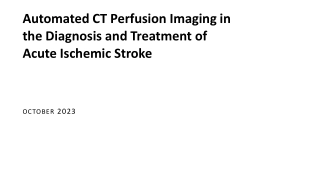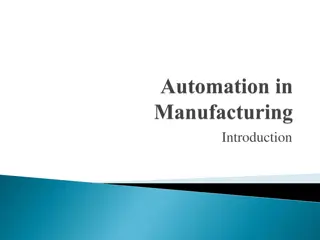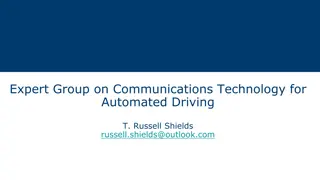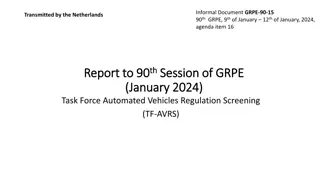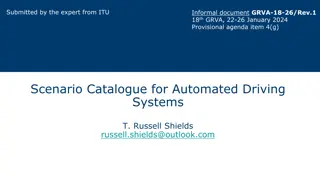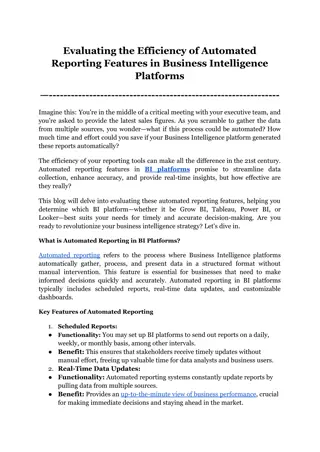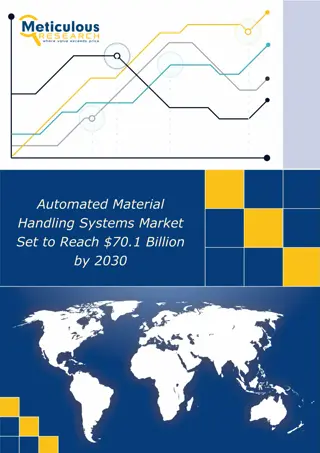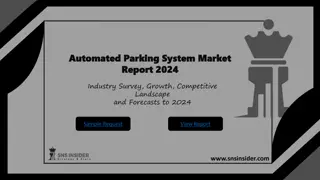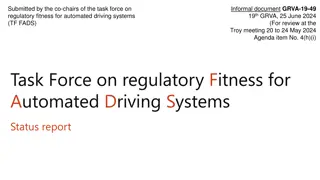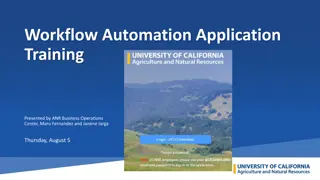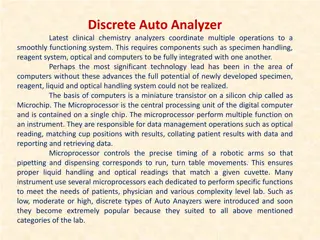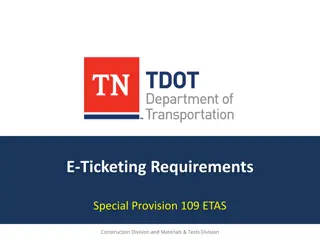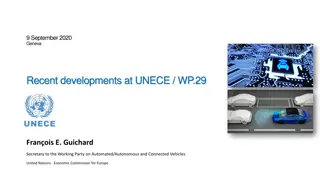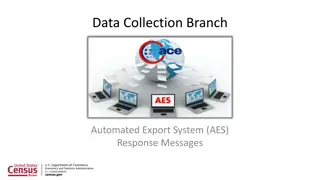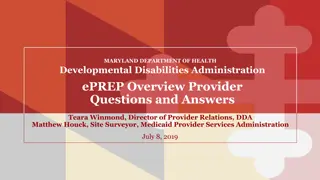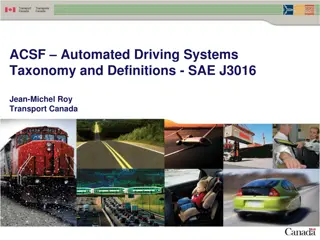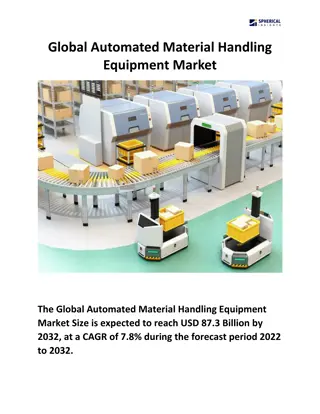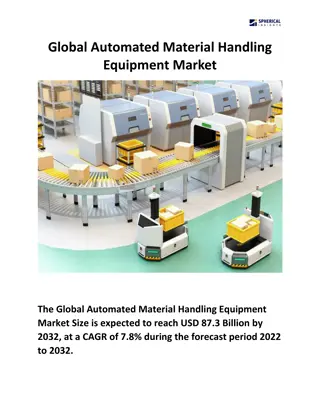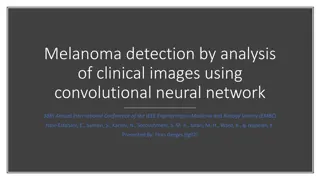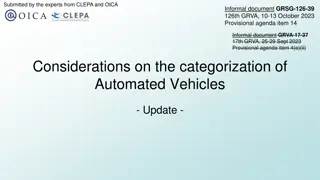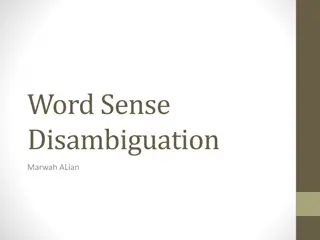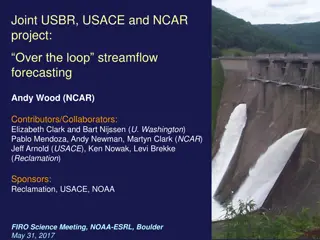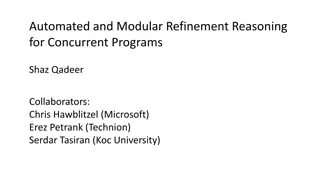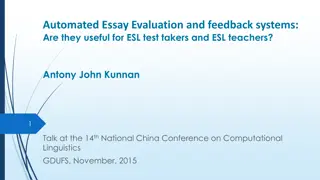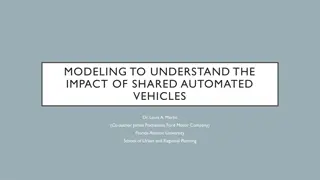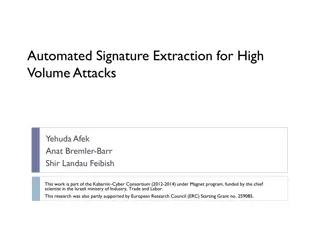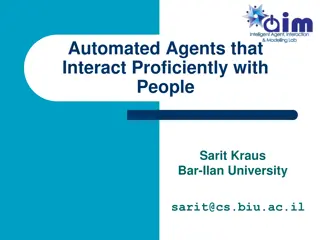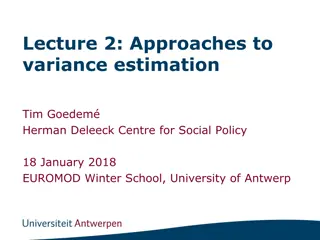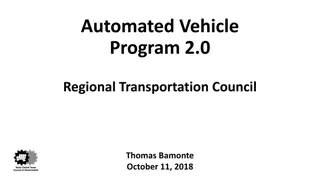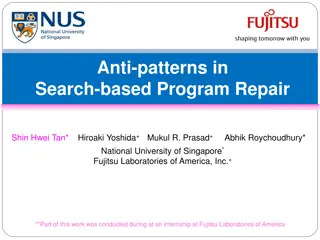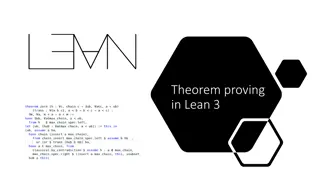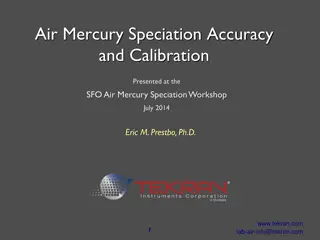Considerations on the categorization of Automated Vehicles
Review existing vehicle categories for automated vehicles (AVs) and proposes new subcategories to address different AV use cases. The aim is to ensure that regulations align with specific AV use cases and provide a logical structure for categorization.
7 views • 9 slides
Status Report: Task Force Automated Vehicles Regulatory Screening (TF-AVRS) of UN Regulations and GTRs under Responsibility of GRSP
This status report provides an overview of the progress made by the Task Force Automated Vehicles Regulatory Screening (TF-AVRS) in evaluating the UN Regulations and GTRs falling under the responsibility of GRSP. It discusses the background, affected regulations, interaction with other GRs, and the
2 views • 13 slides
Automated and Manual Accessibility Testing
The importance of automated and manual accessibility testing, and how it contributes to a complete picture of digital accessibility. Discover best practices and resources to implement digital accessibility effectively.
3 views • 34 slides
Automated CT Perfusion Imaging in Acute Ischemic Stroke: Overview
This presentation delves into the significance of automated CT perfusion imaging in diagnosing and treating acute ischemic stroke. It covers essential information such as the burden of stroke in Ontario, the critical aspect of time in stroke treatment, hyperacute stroke treatment goals, and the impo
4 views • 41 slides
Evolution of Manufacturing Systems: From Handicraft to Automation
The evolution of manufacturing systems traces back to manual craftsmanship and has progressed into automated processes using machines and computerization. Specialization of tasks, organization of production systems, and different categories of manufacturing methods have played crucial roles in shapi
7 views • 19 slides
Update on Biometric Movement Control System (BMCS) & Automated Biometric Identification System (ABIS) Roll-out
Providing an update to the Portfolio Committee on Home Affairs regarding the progress of implementing the Biometric Movement Control System (BMCS) and the Automated Biometric Identification System (ABIS). The BMCS aims to enhance national security by capturing fingerprint and facial biometric data o
2 views • 22 slides
Exploring the impact of automated indexing on completeness of MeSH terms
This study delves into the effects of automated indexing on the thoroughness of MeSH terms. It addresses the novelty of automated indexing, its implications for teaching, questions raised by students, observed missing index terms, and the significance of MeSH in practice. The explanation of how auto
4 views • 33 slides
Navigating the Path to Industry 4.0 with the Automated Guided Vehicle Market
According to BIS Research, the Global Automated Guided Vehicle Market accounted for 138,740 units in terms of volume in 2019 and is expected to reach 272,717 units by 2025. The market is anticipated to grow at a CAGR of 13.32% during the forecast period 2020-2025.
11 views • 2 slides
Expert Group on Communications Technology for Automated Driving
The Expert Group on Communications Technology for Automated Driving, established by ITU, focuses on key topics such as V2V communications capabilities, protecting vulnerable road users, and matching service life of communications equipment with automobiles. The group recently had its first meeting t
0 views • 7 slides
WorkHub24 Digital Transformation Success Stories in Manufacturing and Healthcare
WorkHub24's Business Process Automation led to remarkable transformations in both the manufacturing and healthcare sectors. In manufacturing, manual processes were replaced with automated workflows, resulting in significant time savings, enhanced productivity, and improved communication. In healthca
0 views • 12 slides
Task Force Automated Vehicles Regulation Screening Report
The Task Force Automated Vehicles Regulation Screening (TF-AVRS) conducted multiple meetings and screenings to evaluate regulations and terms related to automated vehicles. The report outlines the screening process, considered items, results, and future plans for regulation screening in the automoti
0 views • 9 slides
Insights into Creating and Maintaining Catalogues for Automated Driving Systems
The document discusses the importance and challenges of developing scenario catalogues for Automated Driving Systems (ADS). It highlights the need for organized methods, user and IT expertise, common formats, and expert analysis in creating and maintaining such catalogues. The focus is on the scenar
0 views • 7 slides
Evaluating the Efficiency of Automated Reporting Features in Business Intelligence Platforms
We evaluate the efficiency of automated reporting features in leading Business Intelligence platforms such as Grow BI, Tableau, Power BI, and Looker. Discover how these tools can streamline data collection, enhance accuracy, and provide real-time insights to drive informed decision-making.
0 views • 7 slides
Automated Material Handling System Market
The Automated Material Handling Systems Market is projected to reach $70.1 billion by 2030, at a CAGR of 8.3% during the forecast period 2023\u20132030.\n
0 views • 4 slides
Automated PARKING SYSTEM
Explore the advancements in Automated Parking Systems, designed to optimize space and enhance convenience. Learn how these systems use cutting-edge technology to automate vehicle parking, reducing congestion and improving safety in urban environments
0 views • 7 slides
Task Force Report on Regulatory Fitness for Automated Driving Systems
The co-chairs of the Task Force on Regulatory Fitness for Automated Driving Systems presented an informal document at the 19th meeting of GRVA, outlining the context, purpose, and status of regulations related to automated vehicles. The report focuses on the need for a regulatory environment for aut
1 views • 10 slides
Automated Workflow Forms Training & Implementation Overview
Learn about the automated workflow forms training and implementation presented by ANR Business Operations Center on August 5th. Understand the purpose, steps, and support available for the process involving various forms related to funding, purchases, and more. Get insights into the automated routin
0 views • 41 slides
Advancements in Discrete Auto Analyzers for Clinical Chemistry Operations
Discrete auto analyzers integrate specimen handling, reagent systems, optical components, and computers for streamlined functionality. The innovation in computer technology, particularly microprocessors, has revolutionized these analyzers, enabling precise data management, liquid handling, and optic
0 views • 17 slides
E-Ticketing Requirements and Automation in Construction Projects
E-Ticketing Requirements Special Provision 109 ETAS focuses on automating ticket generation for interstate resurfacing projects. It mandates e-tickets to replace paper tickets, ensuring data integrity and accessibility. The system must securely maintain data, prevent tampering, and allow inspectors
0 views • 10 slides
Highlights of Recent Developments at UNECE/WP.29 in Geneva
Key developments at UNECE/WP.29 in Geneva include the adoption of new UN regulations on ALKS, CS, CSMS, SU, SUMS, and cyber security. Frameworks like the 1998 Agreement and 1958 Agreement play crucial roles in regulating automated/autonomous vehicles. The focus is on enhancing safety, transparency,
0 views • 15 slides
Comprehensive Guide to Automated Export System (AES) Response Messages
Explore a detailed guide on Automated Export System (AES) response messages, covering topics such as common response messages, fatal errors, compliance alerts, and proper actions for different scenarios. Gain insights into ensuring compliance, resolving errors, and understanding the ITN issuance pro
1 views • 29 slides
Approaches to Study Comparative Politics: Traditional vs. Modern Perspectives
This chapter discusses the importance of approaches in the study of comparative politics, categorizing them into traditional and modern perspectives. Traditional approaches include philosophical, historical, and traditional institutional approaches, highlighting their strengths and limitations. Mode
0 views • 7 slides
Maryland Department of Health ePREP Overview for Providers
Maryland Department of Health's ePREP (electronic Provider Revalidation and Enrollment Portal) streamlines the provider enrollment process by allowing electronic applications, automated reviews, and communication within the platform. Managed by the Medicaid system with the involvement of the Develop
0 views • 15 slides
Automated Driving Systems Taxonomy & Definitions - SAE J3016 Overview
This overview discusses the alignment of international conventions regarding definitions of Automated Driving Systems (ADS) as outlined in SAE J3016. It covers the purpose, availability of SAE J3016, differences in regulations, the use of "autonomous" vs. "automated," and the concept of requesting h
4 views • 12 slides
Global Automated Material Handling Equipment Market
The Global Automated Material Handling Equipment Market Size is expected to reach USD 87.3 Billion by 2032, at a CAGR of 7.8% during the forecast period 2022 to 2032.\n
0 views • 5 slides
Global Automated Material Handling Equipment Market
The Global Automated Material Handling Equipment Market Size is expected to reach USD 87.3 Billion by 2032, at a CAGR of 7.8% during the forecast period 2022 to 2032.\n
0 views • 5 slides
Automated Melanoma Detection Using Convolutional Neural Network
Melanoma, a type of skin cancer, can be life-threatening if not diagnosed early. This study presented at the IEEE EMBC conference focuses on using a convolutional neural network for automated detection of melanoma lesions in clinical images. The importance of early detection is highlighted, as exper
0 views • 34 slides
Update on Categorization of Automated Vehicles by OICA and CLEPA
OICA and CLEPA are updating the categorization of automated vehicles, introducing new subcategories and refining definitions for driverless and dual-mode vehicles. The work aligns with ongoing efforts in related groups and aims to enhance clarity in classifying different types of automated vehicles
0 views • 12 slides
Understanding Word Sense Disambiguation: Challenges and Approaches
Word Sense Disambiguation (WSD) is a complex task in artificial intelligence that aims to determine the correct sense of a word in context. It involves classifying a word into predefined classes based on its meaning in a specific context. WSD requires not only linguistic knowledge but also knowledge
2 views • 12 slides
Over-the-Loop Streamflow Forecasting Project Summary
Joint project by USBR, USACE, and NCAR focusing on improving streamflow forecasting using automated over-the-loop approaches. Key challenges include model calibration, data assimilation, and real-time forcings. Objectives involve building an automated system for short- to long-term flow predictions
0 views • 41 slides
Automated and Modular Refinement Reasoning for Concurrent Programs
This research explores automated modular refinement reasoning for concurrent programs, focusing on safety and correctness in operating systems and applications. Projects like Verve and Ironclad aim to achieve end-to-end security through formal verification tools and small trusted computing bases. Th
1 views • 12 slides
Automated Essay Evaluation Systems in ESL Education
Automated Essay Evaluation (AES) systems are increasingly utilized in ESL education to provide automated scores and feedback on writing assignments. These systems employ mathematical models to assess organizational, syntactic, and mechanical aspects of writing, offering a shift from traditional essa
0 views • 45 slides
Impact of Shared Automated Vehicles on Transportation System Performance
This study by Dr. Louis A. Merlin and James Fischelson explores the potential impact of shared automated vehicles on transportation systems. By reviewing 39 papers and simulations, the research delves into the implications of new shared automated modes, such as automated taxis, shuttles, and shared
0 views • 38 slides
Automated Signature Extraction for High Volume Attacks in Cybersecurity
This research delves into automated signature extraction for high-volume attacks in cybersecurity, specifically focusing on defending against Distributed Denial of Service (DDoS) attacks. The study discusses the challenges posed by sophisticated attackers using botnets and zero-day attacks, emphasiz
0 views • 37 slides
Advancements in Automated Agents for Efficient Interaction with People
Explore the diverse applications of automated agents in various domains such as buyer-seller interactions, cultural studies, conflict resolution, medical applications, sustainability efforts, decision-making support, and training simulations. Discover how these automated agents are revolutionizing p
0 views • 20 slides
Approaches to Variance Estimation in Social Policy Research
This lecture discusses approaches to estimating sampling variance and confidence intervals in social policy research, covering topics such as total survey error, determinants of sampling variance, analytical approaches, replication-based approaches, and the ultimate cluster method. Various methods a
1 views • 34 slides
Regional Automated Vehicle Program 2.0 Overview
Regional Automated Vehicle Program 2.0, led by the North Texas Regional Transportation Council, aims to facilitate the deployment of automated vehicles (AVs) in public entities. The program consists of various projects such as AV planning, cost coverage, and fund allocations for priority deployments
0 views • 10 slides
Automated Program Repair and Anti-Patterns in Search-Based Program Repair
Automated program repair aims to fix bugs in software through fault localization, patch generation, and patch validation using search-based techniques. This research discusses anti-patterns, previous work, repair patterns from human patches, and challenges such as weak oracles in automated program r
0 views • 20 slides
Understanding Automated Theorem Proving in Lean
Dive into the world of automated theorem proving in Lean with a focus on formal verification, history, and the use of logic and computational methods. Explore how programs can assist in finding and verifying proofs, as well as the significance of interactive theorem provers. Discover the evolution o
0 views • 35 slides
Advances in Automated Mercury Speciation Measurement Methods
This content delves into the world of automated mercury speciation measurement methods, focusing on accuracy, calibration, and historical perspectives. It discusses challenges in measuring GEM, PBM2.5, and GOM with hourly resolution, highlighting the significance of continuous monitoring in various
0 views • 23 slides



